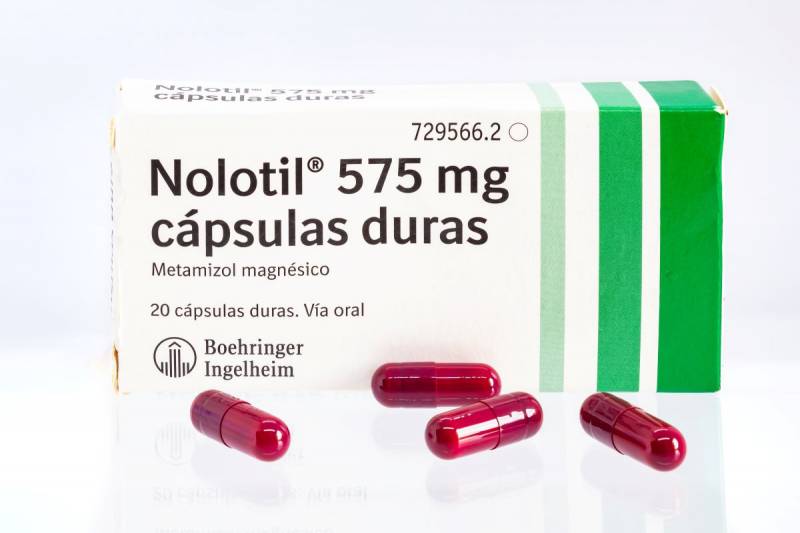article_detail
Date Published: 09/09/2024
Nolotil poisoning patients in Spain denied justice
There is growing concern for foreigners in Spain, who suffer lethal side effects from the painkiller more than Spaniards do

In recent years, Nolotil, a widely-used painkiller in Spain, has sparked controversy due to its alleged life-threatening side effects. Many of those affected, particularly foreigners, have found themselves caught in a bureaucratic struggle as they fight for recognition and justice, only to be met with what many consider a significant blow.
Despite mounting concerns, the European Medicines Agency (EMA) and the Spanish Agency for Medicines and Health Products (AEMPS) have concluded that the benefits of Nolotil outweigh the risks, leaving many victims and their advocates in dismay.
Nolotil, the brand name for the drug metamizole, has been commonly used in Spain since its introduction in 1922 as a painkiller and fever reducer. However, its reputation has been marred by cases of agranulocytosis, a rare but serious condition that causes a severe drop in white blood cells, leaving patients vulnerable to life-threatening infections.
The risk of agranulocytosis, though known and documented, has particularly affected some patients from specific ethnic or genetic backgrounds, including many British and other foreign residents and tourists in Spain.
For years, groups like the Association of People Affected by Drugs (ADAF) have been pushing for more stringent regulations and warnings about Nolotil, especially for foreign patients, who appear to be disproportionately affected.
According to Cristina García del Campo, the president of ADAF, “Many people have been on the brink of death because of a drug that is just a painkiller. To expose yourself to dying in such an unpredictable way... that is not safe.”
Setback for Nolotil sufferers
In September 2023, the EMA released the findings of a safety review of Nolotil and other metamizole-based drugs. While acknowledging that agranulocytosis is a serious and potentially fatal side effect, the EMA ultimately determined that the “benefits of the drug outweigh its risks” when used for its approved purposes.
This ruling was seen as a major blow to those advocating for greater caution, particularly for those who have suffered severe reactions to the drug.
The Spanish Agency for Medicines and Health Products (AEMPS) echoed the EMA’s conclusions, stating that while the risks are present, the current recommendations for identifying and diagnosing agranulocytosis are sufficient to protect patients.
However, the agency did acknowledge that the evidence available “does not allow to rule out or confirm an increased risk in populations with specific ethnic or genetic characteristics,” a factor which is highly relevant to the foreign population affected in Spain.
For victims of Nolotil-related agranulocytosis and their families, the EMA’s ruling feels like a gross injustice. García del Campo has expressed her frustration, stating that many of her clients had taken Nolotil without issue in the past, only to later suffer catastrophic reactions, often without warning.
She highlights the unpredictability of the side effects, which can strike regardless of dosage or prior tolerance, making it difficult to justify continued widespread use without more stringent safety measures.
“People have died from this side effect, both Spanish and English,” she noted, underscoring the severity of the situation. The latest victim, a Spanish patient, tragically died on August 13, 2024 from complications related to agranulocytosis.
García del Campo has vowed to continue fighting for a satisfactory resolution, refusing to accept the EMA’s decision, and the legal battle surrounding Nolotil in Spain is far from over. ADAF, along with other patient advocacy groups, has been gathering evidence to support their case.
Earlier this year, the law firm Almodóvar & Jara submitted documentation for 97 clinical cases of Nolotil’s adverse effects to Spain’s National High Court. In total, the firm represents over 400 individuals affected by the drug, and the Patients’ Ombudsman Association has filed a criminal complaint, with Spain’s Public Prosecutor’s Office now investigating the possibility of health liability.
ADAF has criticised what it perceives as a weak response from regulatory bodies. The association has called for a more rigorous investigation into potential conflicts of interest among members of the EMA’s scientific committee, who played a role in the safety review.
They also argue that the pharmacovigilance efforts from the EMA, AEMPS and pharmaceutical companies have been too focused on keeping the drug on the market, rather than prioritising patient safety.
For those affected by Nolotil, especially foreign patients living in or visiting Spain, the current regulatory stance is deeply concerning. While the occurrence of agranulocytosis is statistically rare, its unpredictable nature and potentially fatal outcome mean that many are left feeling vulnerable and unprotected, but the fight for justice and patient safety in the Nolotil case is far from over.
Loading
Sign up for the Spanish News Today Editors Roundup Weekly Bulletin and get an email with all the week’s news straight to your inbox
Special offer: Subscribe now for 25% off (36.95 euros for 48 Bulletins)
OR
you can sign up to our FREE weekly roundup!
Read some of our recent bulletins:
Discount Special Offer subscription:
36.95€ for 48 Editor’s Weekly News Roundup bulletins!
Please CLICK THE BUTTON to subscribe.
(List price 3 months 12 Bulletins)
Read more stories from around Spain:
Contact Spanish News Today: Editorial 966 260 896 /
Office 968 018 268


























